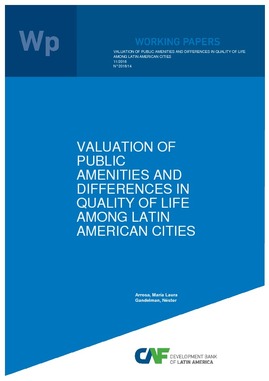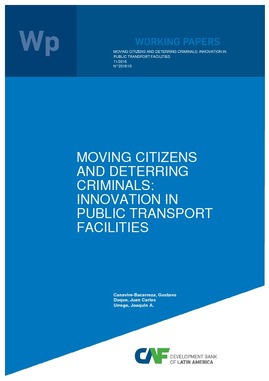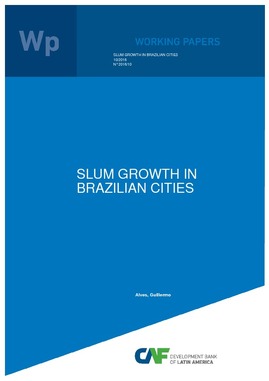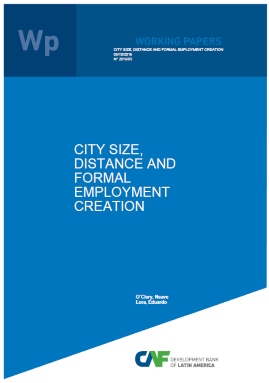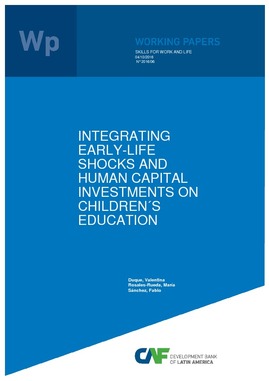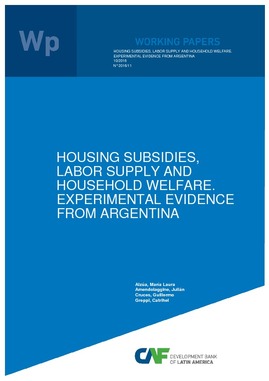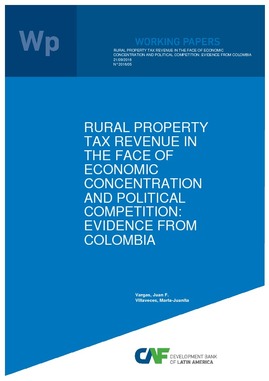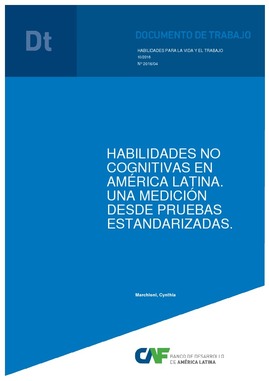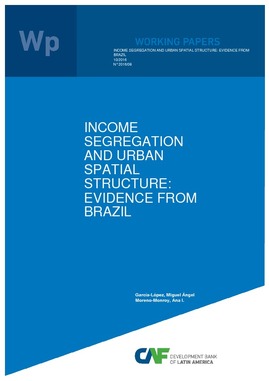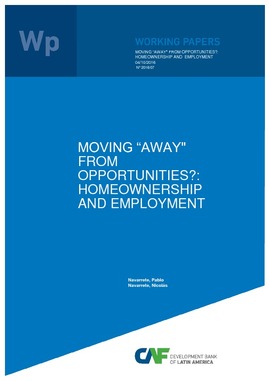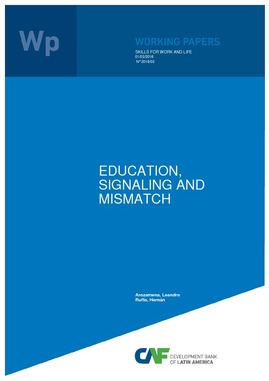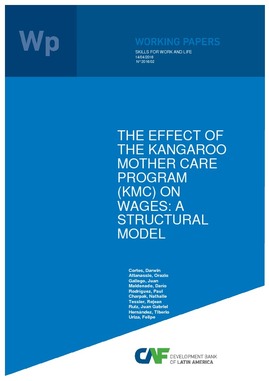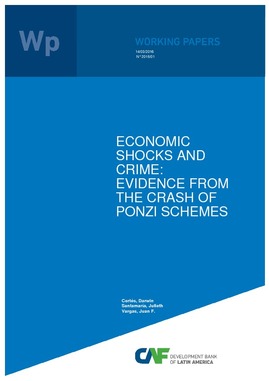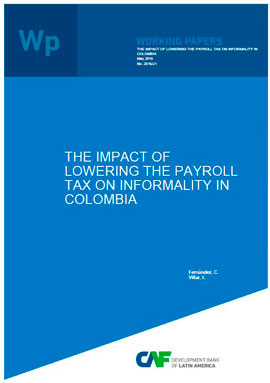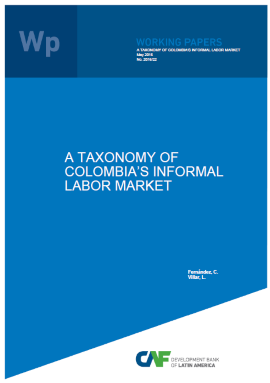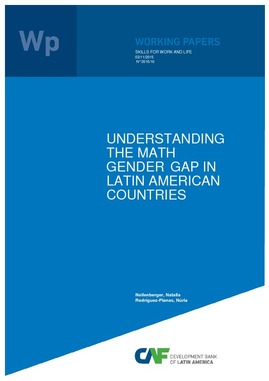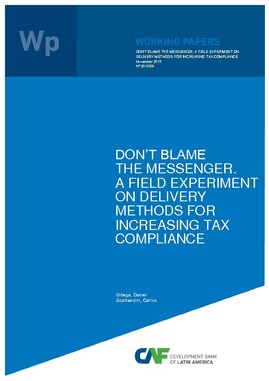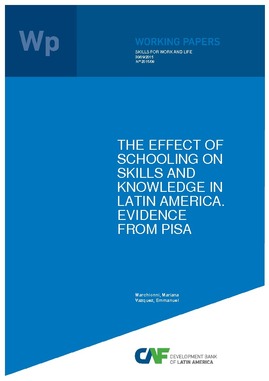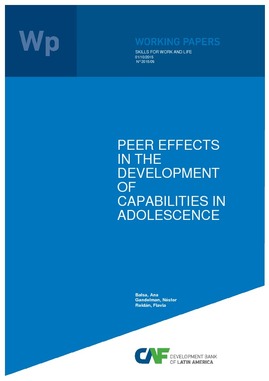6.1 Documentos de trabajo en investigación socioeconómica: Envíos recientes
Mostrando ítems 161-180 de 261
-
Valuation of Public Amenities and Differences in Quality of Life among Latin American Cities
(CAF; Buenos Aires, 2016-11)We use a life satisfaction approach for the valuation of public goods and amenities in Latin American cities. We apply a homogenous database of seventeen cities gathered by the Development Bank of Latin America CAF. Using ... -
What is the Role of Urban Growth on Inequality, and Segregation? The Case of Urban Argentina´s Urban Agglomerations
(CAF; Buenos Aires, 2016-11)We analyze the relationship between urban sprawl and changing patterns of inequality and segregation in metropolitan areas of Argentina. The existing literature has endeavored to study the determinants of the expansion of ... -
Moving Citizens and Deterring Criminals: Innovation in Public Transport Facilities
(CAF; Buenos Aires, 2016-11)This paper explores the relationship between urban public transportation innovation and crime. In 2004, the city of Medellin in Colombia developed an innovative public transportation system based on cable cars (Metrocable) ... -
Slum Growth in Brazilian Cities
(CAF; Caracas, 2016-10-10)I study slum growth in contemporary urbanization processes by estimating a spatial equilibrium model with houses with and without basic water and sanitation services in Brazilian cities between 1991 and 2010. Slum growth ... -
City Size, Distance and Formal Employment Creation
(CAF; Caracas, 2016-10-09)Cities thrive through the diversity of their occupants because the availability of complementary skills enables firms in the formal sector to grow, delivering increasingly sophisticated products and services. The appearance ... -
Integrating Early-life Shocks and Human Capital Investments on Children´s Education
(CAF; Colombia, 2016-10-04)This study investigates how early-life conditions interact with subsequent human capital investments to influence future educational outcomes. To provide causal evidence, we exploit two sources of exogenous variation: i) ... -
Housing Subsidies, Labor Supply and Household Welfare. Experimental Evidence from Argentina
(CAF; Buenos Aires, 2016-10)We study the impact of a social housing policy program implemented in Argentina, exploiting the random assignment rule to identify the policy's causal effect on labor market and other socio-economic outcomes. In particular, ... -
Rural Property Tax Revenue in the Face of Economic Concentration and Political Competition: Evidence from Colombia
(CAF; Caracas, 2016-09-21)We study the relationship between two sources of political power and property tax revenues in contemporary rural Colombia. First, de jure political power is the extent to which local political elites can capture the public ... -
Habilidades no cognitivas en América Latina. Una medición desde pruebas estandarizadas.
(CAF, 2016-08-31)Medir habilidades es complejo, pues son inobservables. Este problema es particularmente importante en la medición de habilidades no cognitivas, donde usualmente se emplean métodos basados en el auto-reporte. Como alternativa ... -
Income Segregation and Urban Spatial Structure: Evidence from Brazil
(CAF; Caracas, 2016-08-05)We estimate the effect of urban spatial structure on income segregation in Brazilian cities between 2000 and 2010. Our results show that, first, local density conditions increase income segregation: the effect is higher ... -
Moving “away" from Opportunities?: Homeownership and Employment
(CAF; Santiago de Chile, 2016-07-10)Homeownership is promoted by the majority of OECD member countries. Nevertheless, the impact that owning a house can have on employment levels is not fully understood. In this paper, we estimate the causal effect of ... -
Education, Signaling and Mismatch
(CAF; Buenos Aires, 2016-06)We assess the importance education as a signal of workers skills and the e¤ects of poor signaling quality on labor market outcomes. We do so by merging a frictional labor market model with a signaling setup where there is ... -
The Effect of the Kangaroo Mother Care Program (KMC) on Wages: A structural Model
(CAF; Caracas, 2016-04-14)In this paper we analyze the relationship between skills and some outcomes later in life for a population of premature children. Pretreatment skills and characteristics are good predictors of childhood and adulthood skills ... -
Economic Shocks and Crime: Evidence from the Crash of Ponzi Schemes
(CAF; Caracas, 2016-03-14)In November 2008, Colombian authorities dismantled a network of Ponzi schemes, making hundreds of thousands of investors lose tens of millions of dollars throughout the country. Using original data on the geographical ... -
The impact of lowering the payroll tax on informality in Colombia
(Caracas, 2016)The Colombian government recently reformed the tax law by reducing payroll contributions from 29.5% to 16% and substituting them with a profit tax. The law was passed in December 2012, and two years later the informality ... -
A Taxonomy of Colombia’s Informal Labor Market
(Caracas, 2016)A taxonomy of the informal labor market is extremely important to understand and handle informality, particularly in a country as Colombia where this phenomenon is large and heterogeneous. As we will argue in this paper, ... -
Understanding the Math Gender Gap in Latin American Countries
(CAF, 2015-12)This paper documents that the math gender gap in Latin America is larger than in other developing or developed countries and that such gap do not decrease after controlling for individual, family and school characteristics. ... -
Don’t blame the Messenger. A Field Experiment on Delivery Methods for Increasing Tax Compliance
(CAF; Caracas, 2015-11)The effect of different delivery mechanisms for increasing tax compliance has not been evaluated so far. This study conducts a field experiment in Colombia that varies the way the National Tax Agency contacts taxpayers on ... -
The Effect of Schooling on Skills and Knowledge in Latin America. Evidence from PISA
(CAF, 2015-09-30)In this paper we estimate the causal effect of an extra year of schooling on mathematics skills and knowledge for the eight Latin American countries (Argentina, Brazil, Chile, Colombia, Costa Rica, Mexico, Peru and Uruguay) ... -
Peer Effects in the Development of Capabilities in Adolescence
(CAF; Caracas, 2015-09-29)We estimate peer effects in cognitive, non-cognitive and health-related outcomes in a sample of Uruguayan high-school students. Our identification strategy is based on two features of the data: (i) parents are not able to ...


